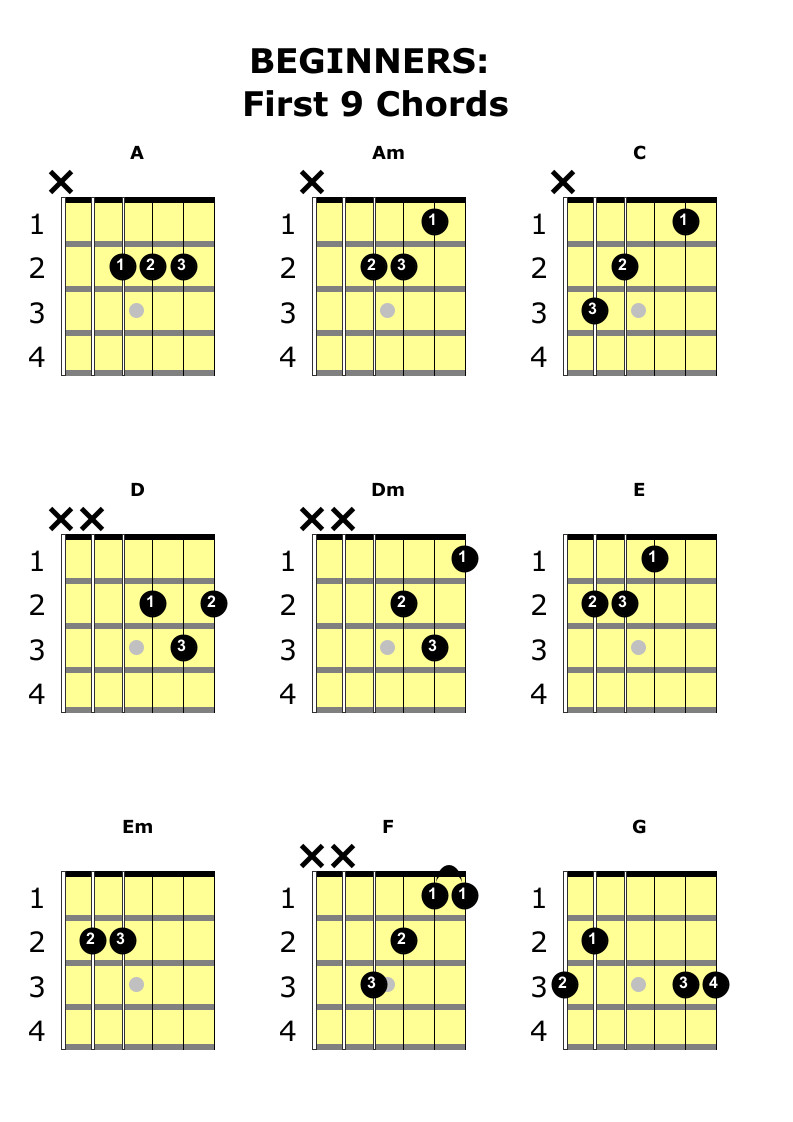Learning to play the guitar opens up a world of musical possibilities, and mastering basic chords is the crucial first step in this exciting journey. For aspiring guitarists, especially beginners, understanding and practicing fundamental chords is essential for playing songs and developing a solid foundation. This guide will introduce you to the most important basic guitar chords, why they matter, and how to learn them effectively.
There are several compelling reasons why starting with basic guitar chords is the smartest approach for beginners:
- Play Countless Songs: A surprisingly large number of popular songs across various genres utilize a limited set of basic chords. By learning just a few, you’ll quickly be able to play along to your favorite tunes and experience the joy of making music.
- Unlock Versatility with a Capo: Using a capo, a simple device that clamps onto the guitar neck, expands your musical horizons even further. With a capo, you can play the same basic chord shapes in different keys, significantly increasing the number of songs you can access.
- Build Confidence for Barre Chords: Basic open chords are generally easier to fret and play cleanly compared to barre chords, which require pressing down multiple strings with one finger. Mastering these fundamental shapes builds finger strength and dexterity, preparing you for the more challenging barre chords later on.
- Boost Motivation and Progress: Learning songs quickly with basic chords provides a sense of accomplishment and encourages you to continue learning. This positive feedback loop is vital for staying motivated and progressing on your guitar journey.
 beginners first 9 chords to learn
beginners first 9 chords to learn
So, which chords should you focus on as a beginner? A great starting point is learning these 9 essential open chords:
- A Major (A): A bright and commonly used chord in many genres.
- A Minor (Am): A melancholic and versatile minor chord.
- C Major (C): A fundamental and cheerful-sounding major chord.
- D Major (D): Another bright and essential major chord.
- D Minor (Dm): A sadder-sounding counterpart to D major.
- E Major (E): A powerful and energetic major chord.
- E Minor (Em): A classic and often used minor chord.
- F Major (F): While slightly trickier initially, F major is crucial and opens up many songs.
- G Major (G): A warm and grounding major chord, very common in popular music.
Each of these chords has a unique sound and contributes to a vast range of musical styles. Learning to play them cleanly and smoothly is key to progressing as a guitarist.
 beginner guitar lessons first chords
beginner guitar lessons first chords
To effectively learn these basic guitar chords, consider these helpful tips:
- Start Slowly: Don’t rush the learning process. Focus on accuracy and clean sound over speed.
- Finger Placement is Key: Ensure your fingers are pressing down firmly just behind the frets for a clear tone.
- Practice Chord Transitions: Smoothly changing between chords is as important as learning individual chords. Practice transitioning between pairs of chords you are learning.
- Utilize Online Resources: Many websites and video tutorials offer detailed instructions and visual aids for learning basic guitar chords.
- Consistent Practice: Regular, short practice sessions are more effective than infrequent, long ones. Aim for at least 15-30 minutes of practice most days.
Mastering basic guitar chords is the foundation upon which your guitar playing journey is built. By focusing on these essential chords and practicing diligently, you’ll quickly unlock the ability to play songs, enjoy making music, and build the skills necessary to explore more advanced guitar techniques in the future. Start with these basic chords, and you’ll be amazed at how quickly you progress and the musical doors that open for you.
